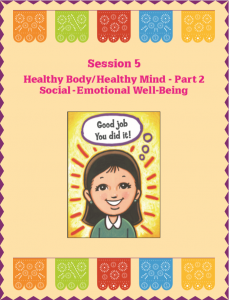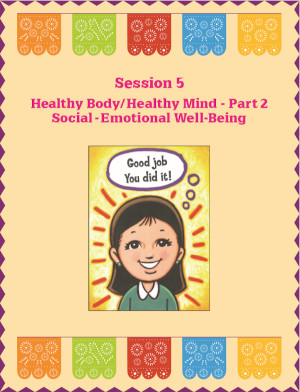In this session participants will explore ways of caring for their own social-emotional well-being, as well as that of their children. Participants will learn some examples of daily activities they can use to help their children feel loved, curious, self-sufficient, and capable of managing their emotions. They will also practice parenting strategies to help their children become self-reliant, self-confident, and socially competent.
Popular Saying: Each mind is a world unto itself.
As a result of this session, participants will:
- Gain concepts, ideas, and tips to nurture the social-emotional development of children ages 0-5.
- Practice parenting strategies that help children be self-reliant, self-confident, and socially competent.
- Understand the importance of self-care.
Background
Developing social-emotional skills is just as important as taking care of our physical health. In fact, social and emotional skills are key components of overall development and are critical for success in school and in life.
Nothing is more important than loving relationships and positive interactions with parents, family members, childcare providers, and other adults. Beginning at birth, these loving relationships help children develop healthy connections, self-esteem, friendships, compassion, and an ability to interact with the world around them in a positive way. When young children experience caring, respectful, consistent, and positive relationships they thrive and flourish as children and adults.
Research shows that the connections between our brains and our bodies influence our behaviors as children and adults. Understanding how behavior is tied to the need to feel safe and loved can empower parents to help their children learn how to manage thoughts, feelings, and actions so they can become healthy and balanced adults.
Developing these social-emotional skills doesn’t always mean “being happy,” hiding up and down emotions such as anger, or avoiding conflict. Rather, the goal is to positively express and effectively manage emotions. Parents can be mindful of their own actions and take advantage of life’s daily activities to stimulate and strengthen their child’s social-emotional development.
According to experts on positive parenting, parents can develop skills to positively parent their children, even under challenging situations. These skills include composure, encouragement, assertiveness, offering choices, empathy, and consequences. In addition, connecting to cultural norms and traditions supports positive self-esteem.
Knowledge and awareness about children’s social-emotional development gives parents a framework for parenting in healthy, positive ways that helps their children thrive. Understanding the need for young children to learn self-regulation is essential for preventing aggressive behavior. Information, early intervention, and using available community resources and services if parents notice their children are behaving in “mean” ways or are victims of this behavior can help prevent and/or solve problems. Support can help reduce the stigma associated with the shame some may feel as a result of aggressive behavior.
Finally, when parents feel overwhelmed – as is normal given the responsibilities that come with parenting – it is important to find time for self-care such as relaxation or to seek support. When parents take care of themselves physically and emotionally, they are better able to be the parent they want to be for their child.


